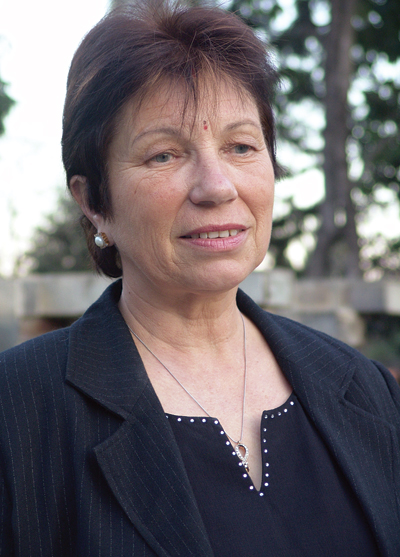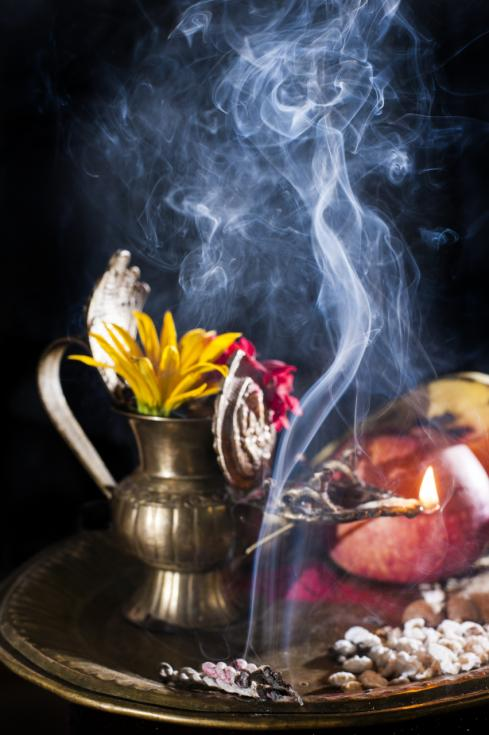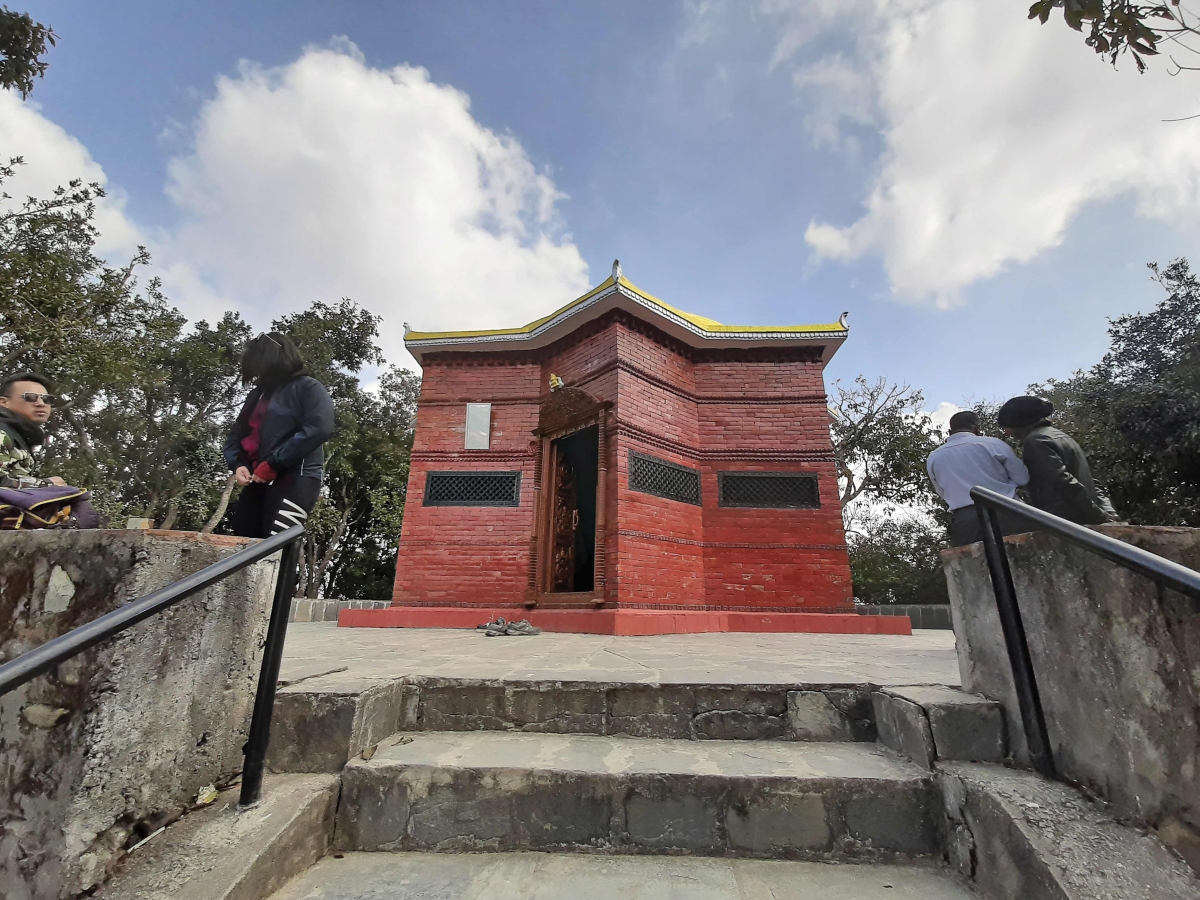Greta Rana was born in Yorkshire, England in 1943. Yorkshire lives in her soul, together with Nepal. Married to Madhukar Shumshere Rana, whom she met in her student years, the couple has three sons and four granddaughters. Greta always told her parents she would be ‘another Shakespeare’. “Only a child,” she says, “would say that”. A writer of a very fine caliber, Greta’s six novels and six poetry collections are a treasure discovered through her perceptive and sensitive eyes and soul. In 1991, her short story, “The Hill”, based on the Godavari Marble Quarry, won The Arnsberger Internationale Kurzprosa. Greta has been living in Nepal for more than 34 years and on December 31, 2004, she retired from the International Centre for Integrated Mountain Development (ICIMOD) where she helped establish a publishing and outreach division 14 years ago. Greta is also a founder member of PEN Nepal and a former Chair of International PEN (Poets, Playwrights, Editors, Essayists and Novelists) Women Writers’ Committee. She lives with her husband and children in Jawalakhel.
 When did you first come to Nepal?
When did you first come to Nepal?
I came to Nepal in 1971 at the age of 28. I had two children then and my third child was born in Nepal.
As a writer, where did you feel you stood at that time?
Well, I felt I stood nowhere in the sense that I had left my own culture. Actually, I left my own culture in 1966 when I sailed to Canada with my husband and my eldest son who was 2 years old then. Air travel was not so common and we sailed there. My mother, grandmother, aunts, sister, brothers, cousins, all came to see us off on the boat, and I remember looking back at Britain and weeping. I never thought I would ever leave Britain in the sense of
semi-permanency.
Over these three decades of living in Nepal, has your perspective as a writer undergone any change or do you still approach your subject with an expatriate’s eye?
I think it has changed tremendously, I think my living here has enriched me. I regret I could never write more than I have so far. When I wrote ‘Im Schatten des heiligen Baumes’, it means ‘A Place beneath the Peepal Tree’, I wrote it in English. My former agent honestly thought I would get a Booker prize. He died soon afterwards, sadly. Harper Collins agreed to publish the book, and then they had a tremendous argument with James (my agent) because they were insisting that the story have an English heroine. I suppose they were thinking of the popular market where heroines always have to be like the readers. Actually good fiction should require the reader to work a little too. My agent thought if we refused to comply, the Murdoch publishing monopoly would decide to have the book shelved for a while. That was in 1996. I refused. I had spent too long writing this book. I started in 1980 and at first it was 800 pages long and was accepted by a company called Muller, Blond and Briggs. Their Chief Editor thought the book could do for Nepal what the Far Pavilions did for the Northwest Frontier. I don’t know what the Far Pavilions did for the Northwest Frontier actually, but that’s the way they saw it. Unfortunately they were taken over by a textbook firm before the book could be published. It’s a long story but I eventually had to have my own book ‘arrested’ to get it back. By then it was the end of 1993. A writer friend advised me to cut down the number of pages and that took from 1994 to 1996. It’s 406 pages in German and it’s probably about the same in English too. Hence when my agent called about the changes I said no. This book is psychologically, philosophically about Nepal, about a small collection of its people and the events that fashioned their lives. I suggested we try foreign publishers and my agent said not to be silly, “Only James Joyce got published in a foreign language before his own.” Actually that’s not correct because so did Samuel Beckett and others. Two days before Christmas he phoned me and said, “Will you publish your book in German?” It came out first in 1997 and is now in paperback in German.
Tell us more about this book?
This book begins in Nepal in 1930 and it’s about three generations of Sherpa women. The third becomes a Nanisaheb. Nanisahebs were women living in Rana palaces who became minor wives. It is about how she dealt with that situation and how she came out of it. One of the leitmotifs throughout this story is that Nepal is historically a place of refuge for people who were coming away from oppression or conflict in their own lands. Iraqis came here hundreds of years ago, others too. This is a place of refuge, which is why the book is called ‘A Place beneath the Peepal Tree’, a place to take refuge in the compassion of Buddha. The German translation I believe is really beautiful. My German is not good but people who read in German have said so.
What about the characters of the book? Are they real people?
No, they are not. I based the actual details of the novel on my own research in the Khumbu and in Helambu areas. I was working on various research programs on women, income generation, tourism and its impact on Nepal. In Helambu, a Sherpa family who had lived with our family helped. I took no one person but a composite. Nima Tshering, an extremely beautiful woman in my novel, is based on a woman I knew, from the point of view of her physical beauty.
Can you list the six novels that you have written, and tell us which among them you consider your best piece of work and why?
I wrote “Nothing Greener”, which is more or less a novella. The other novels are “Distant Hills”, “Right As It Is”, “Guests in this Country”, “Im Schatten des heiligen Baumes” and “Ghosts in the Bamboo”. Presently I am working on the Life of Jung Bahadur for Roli Books India, which is a historical piece on the life of Jung Bahadur. Along with that, I have written a manuscript about the women in Jung Bahadur’s life or Jung Bahadur from the perspective of the women who had to live with him. Both the manuscripts are complete but they need revising now. ‘Guests in this Country’ is a satire. The setting of the book is Laos, Afghanistan and Nepal- Lapalisthan. It’s about a woman who ends up in the wrong place to work for UWILTRI – United World Institution for the Loaning of Technology and Resources Internationally. I wrote that too in 1980, revised it when we returned to Nepal and then published it through Pilgrims. I received a lot of phone calls saying that they knew who the characters were, but they didn’t. They were all fictional. It just shows that truth is stranger than fiction.
Do you harbor any interest in having your work translated in Nepali for wider readership in Nepal and how important do you think it is to be widely read in Nepal?
I think Nepali people relate to poetry. I think Nepal has very fine poets and also short story writers. In many senses, the novel is in a developing form in Nepal. Parijat wrote good novels and she was/is a very famous writer but had she been a man I am sure there would be more sense of urgency about having her work translated into English and promoting it properly. Women writers always have to go that extra mile. Dhruba Chandra Gautam’s book Unwritten (Alikhit) was translated into English by Philip Pierce. I actually feel more should be done to promote Nepali work, and not just tourism or mountain climbing and works of anthropology. If publishers can encourage and sponsor Nepali writers in international languages then they are giving more to readers about Nepal than they will find in glossy coffee table books. Had I come here as an expatriate, to work I wouldn’t have known half of what I know now, I wouldn’t have understood half, or felt half of what I feel. There would have been a social distance, a curtain, no matter how flimsy between myself the observer and others. When you write a novel, story or poem, about things that really move you, as with Parijat, Dhaulat Bikram Bista, Bhawan Dhungana, or Manjul, you see things as they are through the writer’s eyes and soul. If you could get really good translations, then maybe you begin to get a picture of Nepal about the angst (fear) this wonderful German word that moves Nepali society, that moves people and makes them laugh and cry, rejoice and despair. When the reader engages with the writer in this way, the result is empathy-not sympathy which always infers the sympathizer is in a dominant position-but feeling with, being moved with, empathizing.
Is it true that your interest in writing novels took birth while translating Diamond Shumshere’s “Seto Bagh”?
No. I had already written three novels and had a great many poems published before I translated Diamond Shumshere’s “Seto Bagh”. Actually I am not a translator and I never intended to translate anything. You need a professional translator really. It took me two years to translate “Seto Bagh”. Diamond Shumshere asked my father-in-law if I would translate his novel into English and my father-in-law very quickly said ‘yes’. Subsequently, my father-in-law passed away and because he had made a promise, I felt committed to fulfill it. I wasn’t asked to proof the first edition, but one of my colleagues proofed the second one.
Every writer as you know has a source of inspiration or something to portray. What about you?
I was born into a political family, although they very much focused on Yorkshire and on improving conditions there. I look at writing as fulfilling an ancestral dream. There were writers in my ancestry, mainly philosophers. I feel that history, as supposed fact, is written and rewritten and interpreted according to the people who ruled or the government if you like. You can see it very much today. If you watch television, you know the world is presented to us in the way the powers want it to be. Even fame is made by the media. People become famous with very little accompanying talent or excellence.
I also think if you want to look at human rights, human dignity and ordinary people's lives, most societies have more than a dichotomy, they have a multicotomy between layers and layers of people, between haves and have-nots, between men and women. There are divisions, unseen screens that separate each from the other, and I think the people who break down those barriers that separate us individual from individual, ethnic group from ethnic group, nationality from nationality are the real creative writers. I remember many years ago, my husband saying, "It's another world" when he read a collection of poems that I was working on, and I dedicated the collection to him with the message, "It's not another world, it's another way of looking at the world." I think society needs to look at the world in another way, as many other ways as possible. I almost laughed when people began to say in the early ’90s, that with the internet we don't need fiction. If you look at the web today, it's deluged with fiction and writers seem to have the most pages-particularly dead writers. What a pity, they couldn't live to see it! For human beings, there's magic in the written word, a magic that goes back to our very origins.

Massage Away your Stress
A Five Thousand-Year-old Ayurvedic massage helps you de-stress from your hectic life. Life brings in a lot...









